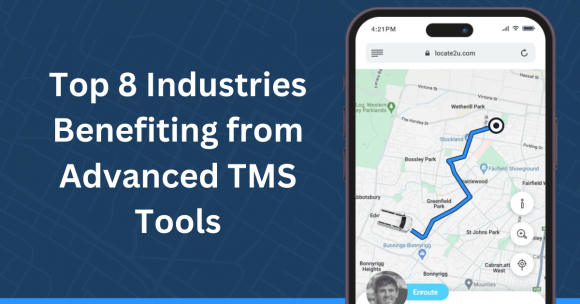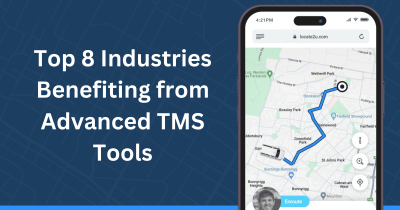The recent changes in Transport Management Systems(TMS) software have improved how businesses manage transportation. A decent TMS system can help companies across various industries streamline operations, reduce costs, and meet growing customer expectations.
A strong TMS can mean the difference between a smooth supply chain and costly inefficiencies, from large-scale logistics operations to niche industries like pharmaceuticals.
In this article, we’ll look at some of the industries currently benefiting from advanced TMS tools.
What is a Transportation Management System (TMS)?
Before examining those specific industries, let’s briefly cover what a TMS does.
In simple terms: A TMS helps businesses optimize and manage their transportation processes. It covers everything from route planning and carrier selection to compliance.
How does it do this? By offering end-to-end visibility. From smoother transportation and route planning right through to the final delivery stages.
Its core features include real-time tracking, warehouse integration, freight billing, etc.
Why Businesses Need Advanced TMS Tools
For years, businesses – both large and small – managed logistics manually. But that is no longer enough. And many still do.
But a 2024 study from Research and Markets predicts the global transport management system market will grow at a CAGR of 11.2% by 2028. This growth is driven by rising e-commerce demands and supply chain disruptions.
As the markets evolve, companies will need advanced TMS tools to improve efficiency and visibility, especially if they want to implement cost savings measures.
Top Industries Benefiting from Advanced TMS Tools
Here are the eight top industries that benefit the most from advanced transport management tools.
1. Retail and E-commerce
Retailers rely on transport management software solutions to meet growing customer expectations for fast and accurate deliveries.
Example: Major retailers like Amazon and Walmart use TMS to optimize their massive delivery networks.
2. Agriculture and Farming
When we sit down to enjoy a hearty meal, we don’t always spare a thought about the behind-the-scenes logistics of getting food from farm to table.
It’s a complex juggling act, and farmers depend on timely shipments of livestock, feed, and perishable goods.
How does TMS help? Transport management tools improve routing and reduce transportation costs.
The result: Fresh produce reaches markets faster
3. Food and Beverage Distribution
Managing perishable goods requires strict temperature control and real-time tracking.
That alone could turn into a logistical nightmare if not managed properly. But there’s hope!
Example: TMS software helps companies like Sysco optimize delivery routes. The benefit they get from that is minimized delays and reduced food spoilage.
4. Pharmaceutical and Healthcare Logistics
TMS ensures compliance with strict regulations for shipping medical supplies, vaccines, and equipment.
How does TMS help? Combined with real-time tracking, this ensures life-saving medicines arrive on time and in optimal conditions.
READ: Transport Management System Explained: What You Need to Know
5. Manufacturing and Industrial
Factories depend on precise inventory and raw material transportation to keep production running.
Just one hiccup with inventory management can yeet an entire factory into chaos as staff juggle to fix the error while keeping customers and/or suppliers calm.
Example: TMS tools help manufacturers like Toyota reduce transportation bottlenecks, avoiding costly production delays
6. Construction and Heavy Equipment Transport
Moving bulky materials and machinery efficiently is critical for the construction industry.
Beyond just improving efficiency, businesses in this sector also need to prioritize employee safety to reduce the risk that even a minor glitch can cause.
How does TMS help? With a proper TMS, construction businesses can plan routes and reduce fuel costs, all while ensuring the safe transport of oversized loads.
7. Oil, Gas, and Energy
Energy companies use TMS to track fuel shipments, optimize tanker routes, and comply with environmental regulations.
How does TMS help? Real-time tracking prevents delays and ensures a steady supply chain for essential resources.
8. Freight forwarding and 3PL
TMS software also helps third-party logistics (3PL) providers manage multi-carrier networks, route planning, and freight auditing.
Example: Companies like DHL and FedEx use advanced TMS platforms to offer flexible shipping solutions. Flexible, accurate deliveries = happy clients.
Final Takeaways on TMS Benefits for Industries
From retail giants to healthcare providers, industries that rely on efficient transportation management see massive cost savings and operational improvements with TMS.
Thus, investing in an advanced transport management system isn’t just a choice…
It’s becoming a necessity for fast-moving supply chains.
About the author
Cheryl has contributed to various international publications, with a fervor for data and technology. She explores the intersection of emerging tech trends with logistics, focusing on how digital innovations are reshaping industries on a global scale. When she's not dissecting the latest developments in AI-driven innovation and digital solutions, Cheryl can be found gaming, kickboxing, or navigating the novel niches of consumer gadgetry.











